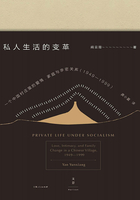A religion,however,represents more than can be estimated by this simple test.The poetical value of Homer is not destroyed by disproving the existence of the Pagan deisms,nor the value of the Hebrew Scriptures by disproving the existence of jehovah.The facts alleged may be fabulous and absurd;but they are also symbols for setting forth views of the world and of conduct,and so giving emphatic utterance to important truths.The old religions were attempts of men,in early stages of thought,to embody ideals of conduct which may really have been of the highest value to mankind.They were essential,again,to the social bonds which have,in fact,determined the formation of society and facilitated the growth of sympathy and philanthropy.
Therefore,if a religious creed be false when interpreted as a simple statement of fact,we have not exhausted its significance or even touched the really most important significance of the religion itself.Believers felt more or less clearly that such attacks as 'Philip Beauchamp'affected only externals,and left the need for religion unsatisfied.Only as the actual creed was pledged to maintain the truth of certain statements,which were daily becoming more incredible,the necessity appeared of finding some stronger position than the old Paley scheme,which virtually regarded religion as a mere statement of historical fact,or as a department of natural science.To trace the consequences would be to write a history of modern theology.I shall try only to indicate the relation to the Utilitarians of a few thinkers.Two main lines of thought were conspicuous in Mill's generation,and correspond to what Newman called 'liberalism'and 'dogmatism.'
VIII.LIBERALISM
A very instructive example of one phase of liberal thought was Frederick Denison Maurice (1805-1872).Before Mill's attack upon Mansel,Maurice had been engaged in a sharp controversy invoked by the Bampton Lecturer.No two men could be more thoroughly at cross-purposes.In their arguments each word bears a different signification for the two disputants.Each,of course,vehemently disapproved the other;and Mansel was provoked to call Maurice a liar(162)in direct terms.The real difficulty is to reduce the argument to any common measure;and Maurice's position,though not easy to define,is significant.
Maurice,(163)as I have said,was one of Mill's friendly adversaries in the early debating society.His references to Mill are always respectful,little as could be their intellectual sympathy;while Mill's judgment was that 'more intellectual power was wasted in Maurice than in any one else of my generation.'
Deep respect for Maurice,admiration of his subtlety and power of generalisation,only increased Mill's wonder that he could find all truth in the Thirty-nine Articles.(164)Maurice had been brought up as a Unitarian,and was profoundly impressed by the barren wrangling over the dogmatic partitions of various sects.
After long hesitation he at last found satisfaction in the Church of England and,as he declared,by accepting the Anglican formula in their obvious and most natural sense.To men of other persuasions,his interpretation appeared on the contrary to amount to a complete transformation of their natural meaning.
Maurice was therefore excluded from all the higher preferment,and passed for an insidious heresiarch.He replied by a full and frank,though hardly a lucid,assertion of his own convictions;and gradually proved,even to his enemies,his entire superiority to any worldly motives.He was expelled in 1853from his professorship at King's College for denying the truth of the popular version of hell,a little before the denial had become a commonplace.Disciples had already gathered round him and regarded him with the reverence due to the purity and loftiness of his character.As the head of the Christian Socialists in the critical period of 1848,he had at least given a proof that divines could take a genuine interest in the great social problems of the day.Maurice himself was little qualified for business details,and the whole movement failed for the time,like most others which start from the sympathy of the outsiders instead of the actual experience of the actual sufferers.It was,however,significant of a most important change,more easily underestimated than exaggerated.Maurice deserves all respect,as Mill observes,for his action,of which,moreover,it is only just to say that it was really characteristic of his whole position.















